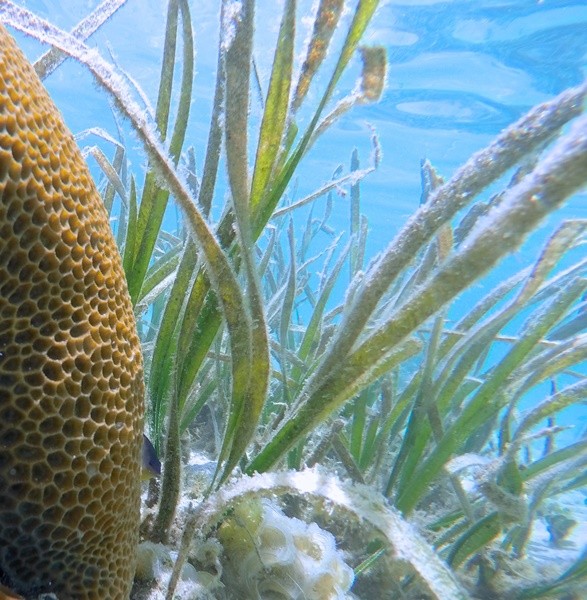
Seagrasses reduce bacteria, benefiting human welfare, marine life in Indonesia
February 17 2017
Seagrass meadows reduce bacteria pathogenic to humans and marine life by up to 50 per cent, a study in Indonesia co-funded by the Capturing Coral Reef & Related Ecosystem Services project (CCRES) and reported in Science magazine today has found.
These findings highlight the importance of seagrass ecosystems to the health of people and marine organisms, including coral reefs, fisheries (wild and farmed) and seaweed in coastal areas worldwide, the authors of the report say. Not only could seagrasses help with improving water quality in ever more populated coastal zones (it is estimated that one billion people will inhabit low-lying coastal zones by 2060) they could also play a key role in sustaining the rapid increase of aquaculture in the face of global food shortages.
Removing human pathogens from water is essential for human health. Plants, with their natural biocides, play a vital role – one that can offer significant economic benefits. Although seagrasses are known to produce natural antibiotics, they have not been evaluated for their ability to remove pathogens from the ocean, or for their ability to mitigate disease there.
Working off four islands in South Sulawesi lead-author Dr Joleah Lamb, Cornell University, Ithaca, USA, and her colleagues, including researchers from Hasanuddin University, Makassar, Indonesia, sought to assess the influence of seagrass on marine microbial pathogens and disease. They found the presence of the bacteria Enterococcus to exceed recommended human health level by 10-fold. However, levels of the bacteria were reduced three-fold in the presence of seagrass.
Further studies revealed that the abundance of marine fish and invertebrate pathogens was 50 per cent lower when seagrass was present. And, field surveys of over 8,000 reef-building corals adjacent to seagrass meadows showed two-fold reductions in disease compared to corals without seagrass neighbors.
“These findings send a clear message to other regions in the world about the potential benefits that seagrass meadows can have on human and marine organism health, said Dr Lamb.
“By reducing waterborne pathogens and improving water quality, seagrass ecosystems provide coastal communities with an essential service - water filtration - with a substantial economic value.”
The global loss of seagrass meadows is estimated at seven per cent each year since 1990.
One of the report’s co-authors Prof. Jamaluddin Jompa, Dean, Faculty of Marine Science and Fisheries, at Hasanuddin University – a CCRES project research partner in Indonesia - says he hopes the study’s findings will raise awareness of the importance of protecting seagrass ecosystems.
“Most Indonesians have not realized the significant roles of seagrasses, especially in the context of reducing pathogens that could endangered both people and nearby ecosystems,” Prof. Jompa said. “The findings show that we need to think of seagrasses as a national treasure.”
Prof. Jompa said the findings revealed why protecting the quality and quantity of seagrass ecosystems should be an integral part of coastal ecosystem management in most coastal areas of Indonesia, especially those adjacent to Marine Protected Areas (MPAs) or tourism areas. “These findings will urge government and communities to consider allocating more seagrass ecosystems as "no take areas" and to restore seagrass habitats that have been badly degraded.” Prof. Jompa said .
Another co-author Prof. Drew Harvell, from the Department of Ecology and Evolutionary Biology at Cornell University, said seagrass ecosystems could play in important role in sustaining a fast-growing source of the world’s food, aquaculture – an industry that is highly susceptible to disease outbreaks from bacterial infections. “Integrating seagrass treatment systems with aquaculture could lower the economic and environmental costs accompanying routine use of vaccines, pesticides and therapeutics for treatment of marine disease outbreaks, Prof. Harvell said.
Says CCRES chief scientist Professor Peter Mumby, from the Marine Spatial Ecology Lab at The University of Queensland: “This latest discovery from CCRES adds to a growing picture of the many ways in which people benefit from natural ecosystems; something many of us take for granted.”
The CCRES project is a regional technical support project in Indonesia and the Philippines funded by the Global Environment Facility (GEF), the World Bank and UQ. UQ’s Global Change Institute is the project executing agency. International partners include Cornell University and the University of California (Davis) from the USA, the University of the Philippines’ Marine Science Institute from the Philippines, and Currie Communications from Australia.
More details / media interviews
Dr. Joleah Lamb
Postdoctoral Research Fellow
Cornell University, USA
Tel. +1 202 344 9316
Email
Twitter: @JoleahLamb
Prof. Jamaluddin Jompa
Faculty of Marine Science and Fisheries
Hasanuddin University, Indonesia
Tel +62 411 586 025
Email
Related links
Science news: Underwater grasslands can cut concentrations of harmful bacteria in half
Science / Cornell media release: Underwater seagrass beds dial back polluted seawater
Science paper: Seagrass ecosystems reduce exposure to bacterial pathogens of humans, fishes, and invertebrates
Video briefing: Breaking Research News—Seagrass Ecosystems Reduce Exposure to Bacterial Pathogens of Humans, Fishes and Invertebrates
Cornell news: Underwater seagrass meadows dial back polluted seawater



